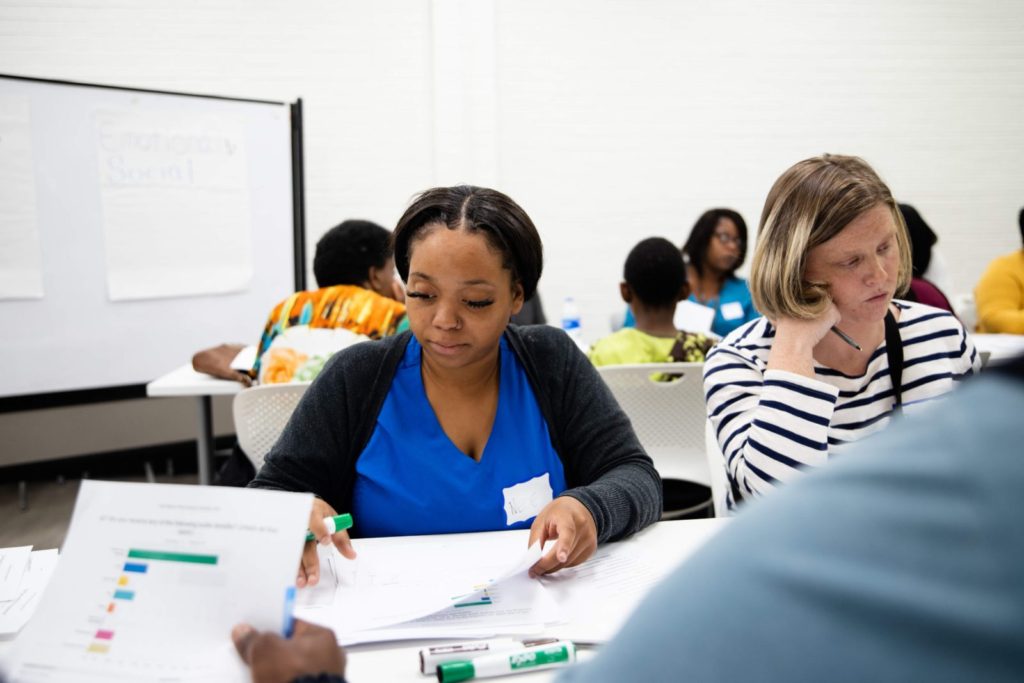Read the full Chronicle of Philanthropy article here!
The Chronicle of Philanthropy
By Kelley Gulley and Fay Twersky
Co-chairs, Fund for Shared Insight
November 21, 2019
At a New York nonprofit that provides arts classes and job training, staff members realized they had work to do after they reviewed responses to a survey of the young people they serve: While students gave the organization high marks over all, white students rated it highest, followed by Latinx students. Black students gave the lowest ratings.
These differing scores prompted staff members at the organization, the Art Effect, to examine what was behind the discrepancy. They recognized the need to translate course and marketing materials into Spanish and to collect demographic data in a more systematic way. Most significantly, they created a 10-week program to bridge the gap between its job-training courses and those that teach advanced arts skills.
5 QUESTIONS ANY NONPROFIT CAN POSE TO GET FAST FEEDBACK
Organizations participating in Listen4Good use a simple survey tool that includes these questions:
- How likely is it that you would recommend [organization] to a friend or family member?
- What is [organization] good at?
- What could [organization] do better?
- Over all, how well has [organization] met your needs?
- How often do staff at [organization] treat you with respect?
The first three questions are adapted from the Net Promoter System, developed by Fred Reichheld at Bain & Company, which is widely used by businesses to gauge customer loyalty.
“We unearthed a real ‘aha moment’ when analyzing the survey results,” Mary Ellen Iatropoulos, the education director, told us, one revealing inequities that the organization may have been unintentionally perpetuating.
More and more nonprofits like Art Effect have been getting feedback about their work through Listen4Good, an effort run by Fund for Shared Insight, the grant-making collaborative we co-chair. Feedback has prompted a wave of action in response, but it was not until more recently that many organizations have come to see that this listening work is not just about improving programs but can also be central to promoting diversity, equity, and inclusion.
While in the past, people a nonprofit serves might have been overlooked or excluded when programs were designed, now many nonprofits are bringing more diverse voices and perspectives to decision-making. They are engaging with the people they serve in a more respectful and inclusive way and making changes intended to reduce disparities and lead to equitable experiences and outcomes for everyone they serve.
An Explicit Connection to Equity
Our House, a homelessness services organization in Little Rock, Ark., offers an example of how feedback can empower clients, shift organizational culture, and lead to meaningful change. Our House has surveyed hundreds of clients six times over the past three years as part of Listen4Good.
A community council, made up of participants in each of the organization’s programs, interprets survey results and recommends actions in response. “I was excited and a little nervous because it was on our shoulders to give our community what they were asking for,” says Sharonica Lee, an Our House client who was a member of the community council, in a video about Our House’s experience with feedback.
After the community council makes recommendations, Our House holds a series of public “Talk Back” events to share survey results and discuss the council’s decisions and how changes will be put in place.
In one of its early Listen4Good rounds of feedback, Our House heard that parents were not participating in evening support groups, counseling, career training, and other services because there was no child care in the evening. Based on that feedback, Our House sought and secured funding to offer evening child care, which now allows hundreds of additional parents to attend programs each year.ADVERTISEMENT
Our House’s executive director, Ben Goodwin, describes how the organization’s culture of feedback supports its broader mission of empowerment. “We want our clients to believe that they are valued members of a community, that new ideas are achievable, that change is possible, and that they can be part of that change. That starts here at Our House.”
While feedback can be a powerful tool to shift power and change systems in ways that lead to greater equity, we’ve also learned that the connection isn’t automatic. In fact, people can end up feeling disempowered if they don’t believe their feedback has been heard or acted upon. That’s why Listen4Good emphasizes the importance of “closing the loop,” as Our House did with its Talk Back sessions, which means going back to those who gave feedback and sharing what was heard and how the organization plans to respond.
Beyond Direct-Service Nonprofits
The nonprofits participating in Listen4Good provide direct services, but we believe that listening, feedback, and other forms of meaningful connection with people and communities are equally important for nonprofits and grant makers that work on advocacy, policy, and systems change, as Betsy Krebs, vice president of poverty programs at the JPB Foundation, wrote in the Chronicle earlier this year.
Many foundations—particularly large national and international grant makers—are far away from the people they seek to benefit. One of Fund for Shared Insight’s goals from the outset was to bring more voices and perspectives to the table as foundations make decisions about strategy and programs.
Both our foundations are moving toward that goal in our own work.
In 2016, the James Irvine Foundation worked with community organizations to host 14 listening sessions across California. We spoke with more than 400 Californians to inform our new focus: a California where all low-income workers have the power to advance economically. In 2018 we commissioned a survey of more than 1,000 low-income workers in California to learn about their perspectives and experiences, and this week we released the findings after in-depth interviews with Asian-American and Pacific Islander workers. (The fastest growing immigrant population in California is from Asian and Pacific Island nations, and too often research and listening efforts group those individuals into a single category, reducing the ability to draw meaningful conclusions about their lives and needs.)
At Irvine, we heard in the community listening sessions that housing was a significant challenge, even for skilled workers who make middle-class wages. As a result, Irvine is now conducting some grant making to explore how we can best support housing efforts in California.
At the Hewlett Foundation, we have committed to incorporate listening into all our grant making. This year we took inventory of all our efforts to consider the views of citizens and community members. We found a lot of listening already going on. For example, program officers who award aid to protect the environment have reached out broadly to better understand the views of all community members, including rural voices and tribal leaders, on conservation in the North American West.
And our program officers who are focused on population and global development work take steps to hear directly about the aspirations of adolescent girls in East and West Africa with respect to reproductive health.
But we also heard an appetite to do more listening, so we commissioned research to learn what other foundations do. That study found bright spots at foundations of all types, along with growing interest in listening and seeking feedback as a way to promote equity and inclusion.
Still, the study found more talk about listening than action, especially at large national and international foundations that are trying to produce changes in education, health, or other systems.
That gap between action and intention is unfortunate because we’ve seen firsthand the power of listening and soliciting feedback. Across the country, feedback on programs and services is helping organizations like Art Effect and Our House become more inclusive and make changes that will lead to greater equity and better outcomes for all. Many foundations and nonprofits that are already committed to equity and inclusion view listening as key to living out those values.
A growing number of nonprofits and grant makers see advancing equity as essential to their missions but may not know how or where to begin. Our experience, with Listen4Good and at our respective foundations, suggests that listening can be a powerful place to start. Grant makers and nonprofits that hope to promote equity around the world would be wise to embrace the feedback movement.

